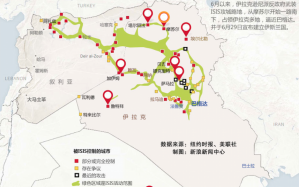
Although the jihadi of northern Iraq have asserted their mission to turn every country into an Islamic state, the group has historically been strangely silent concerning China.
And, in 2003, China strongly condemned the U.S. invasion of Iraq, but showed no inclination to get involved one way or the other. Up until recently, the Chinese government seemingly ignored the Middle Eastern conflicts entirely.
However, is quickly changing, as the Islamic State (IS) recently made revenge threats against China and other countries for seizing "Muslim rights." Since the news broke via Phoenix Weekly, a Hong-Kong based newsmagazine, the article has been widely circulated on Chinese news websites and has gained popularity on social media as well.
In the article, the author highlights a July 4 speech made in Mosul, Iraq, by IS leader Abu Bakr Al-Baghdadi in which he urged Muslims around the world to pledge their allegiance to him. Baghdadi stated that "Muslim rights are forcibly seized in China, India, Palestine" and more than a dozen other countries and regions. "Your brothers all over the world are waiting for your rescue, and are anticipating your brigades," Baghdadi told his followers. According to the magazine, China was mentioned first on Baghdadi's list.
BBC News reports that the article also includes a map that shows the vast territory IS plans to occupy in the next five years, which appears to include a significant portion of Xinjiang. While the credibility of the map has been questioned, the magazine reports it as fact.
Ordinary Chinese who formerly may have paid little attention to IS have responded to the pending threat with mixed reactions online:
"This is good. It offends all five of the hooligans on the UN Security Council" -- that is, China, France, Russia, the United Kingdom, and the United States -- which means the Muslim extremists "are going to be roadkill," wrote one user on Weibo.
Another user wrote that the jihad seemed to have "a death wish," but that people should be grateful because the group was giving Beijing "a reasoned and evidence-based opportunity to crack down on terrorist activities."
China-which receives 10% of its oil imports from Iraq-has expressed growing consternation about the influence Muslim extremists may have in Xinjiang if infiltrated. Because the country has been fighting a separatist insurgency of its own in the region for the past several years, authorities fear IS may"embolden the simmering independence movement" (Foreign Policy).
On July 8, Chinese special envoy Wu Sike met with Iraqi Prime Minister Nouri al-Maliki and guaranteed anti-terror support, noting that Beijing would fully respect the country's sovereignty, reports the Associated Press. When Wu returned to Beijing he told reporters that China was a victim of terror with roots in Syria and Iraq. "Solving the conflicts in Iraq and Syria will benefit China and the entire world," he said.
"Wu's speech shows that China is paying close attention to the Middle East situation and is fully aware of the grim influence the recent upsurge of violence in Syria and Iraq has cast on global terrorism activities, including terror attacks in Xinjiang," Xiao Xian, a professor from the Institute of International Studies at Yunnan University, told the Global Times.
On August 8, when asked to comment on U.S. President Barack Obama's announcement that the United States military would carry out airstrikes on targeted insurgents in Iraq, Chinese Foreign Ministry spokesperson Hua Chunying stated that China was "keeping an open mind" about operations that would "help maintain security and stability" in Iraq. She also noted that China's embassy in Iraq has asked for Baghdad "to take concrete measures to ensure the security of Chinese citizens," and held out hope for Chinese assistance, saying "We are ready to continue with our help as our capacity allows."
Zhu Weilie, director of the Middle East Studies Institute at Shanghai International Studies University, told the state-run Global Times on July 29 that while the Chinese government may send assistance, they believe the United Nations should primarily handle the crisis in the Middle East.
"China will be more actively involved in these efforts but will never be as involved in Middle East affairs as the United States," he said.







